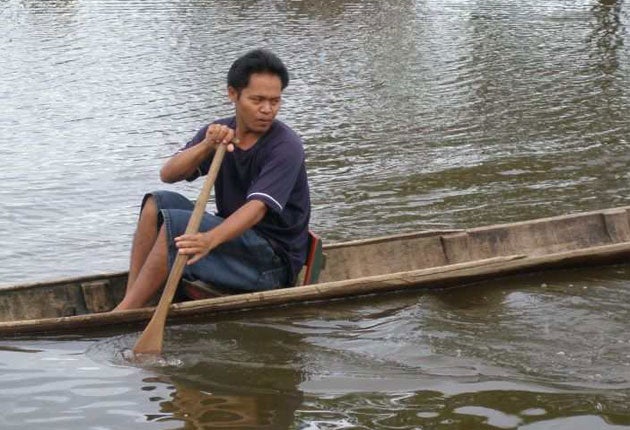Independent Appeal: Fishermen helped to escape the human sharks

Your support helps us to tell the story
From reproductive rights to climate change to Big Tech, The Independent is on the ground when the story is developing. Whether it's investigating the financials of Elon Musk's pro-Trump PAC or producing our latest documentary, 'The A Word', which shines a light on the American women fighting for reproductive rights, we know how important it is to parse out the facts from the messaging.
At such a critical moment in US history, we need reporters on the ground. Your donation allows us to keep sending journalists to speak to both sides of the story.
The Independent is trusted by Americans across the entire political spectrum. And unlike many other quality news outlets, we choose not to lock Americans out of our reporting and analysis with paywalls. We believe quality journalism should be available to everyone, paid for by those who can afford it.
Your support makes all the difference.The fishermen of the Agusan marshes in the southern Philippines island of Mindanao have to watch out for sharks, but they do not find them in the water. It is a hard life for the Manobo people who live around the 59 lakes and rivers of the marshland. The natural crop they seek to harvest is the mudfish which they sell to the mainstream Muslim population who regard the fish as a delicacy. It is not a dependable livelihood because the freshwater fish is abundant only when the rains come. The dry seasons – from April to May and again from September to November – signal the hard times.
The sharks who prey on them are of the human variety. Middlemen offer cash advances or loans for the over-priced fishing nets they supply, then tie the fisher families to sell at knock-down prices. Sometimes, these traders pay less than a third of the price the fish fetch in the markets just down the road.
With no other source of capital, the fisher families are trapped. Or at least they were until a fish-processing co-operative was set up with the support of One World Action, one of the three charities which have been featured in this year's Independent Christmas appeal, which closes today. The co-op's processing plant buys fish for double the usual price and has trained local people in improved drying and salting techniques to raise the quality of their produce. The project is typical of the work of the three charities on which Independent correspondents around the globe have reported every day for the past month. For each has gone beyond giving hand-outs and has empowered people in some of the world's poorest communities to take control of their own destinies.
The emphasis, in Mindanao as elsewhere, has been on assisting disadvantaged people to bring about change in their own societies. One World Action, we have seen, works by developing organisational, lobbying and advocacy skills among local people. VSO sends skilled professionals from all over the world, a quarter of them now from developing countries, to share their expertise with those most in need. Our third charity, Action on Disability and Development, has helped waken the potential of many who felt disability condemned them to a life in the dark.
We have encountered some inspiring figures, including Memory Phiri, who was raped at the age of nine in Zambia and has since become one of the world's most potent Aids campaigners. Or Ou Sarin, who was cruelly nicknamed The Frog after he lost his legs to a landmine in Cambodia, but who has now become one of the leaders of his community. Or Innocent Sombie, who spent the first 14 years of his life in a darkened hut thinking he was the only disabled person in the world, and who now participates fully in the life of his west African village.
"What we've seen is the resilience, commitment and impact that individuals can make," says Catherine Raynor, of VSO. "And it has been about a lot more than raising money."
The appeal has made an impact. "It has made the people who were written about feel a link with UK citizens," says Graham Bennett of One World Action. "The article on the Dalits [untouchables] of Bangladesh was the first ever to be written about this group in the UK. The Bangladeshi Minister for Education has distributed it within her ministry. The article has been photocopied and distributed within the Dalit colonies; although most cannot read English, they have seen themselves in the photo, and been given further hope and inspiration that their causes are noticed and that people care."
It is not too late to make a contribution. The appeal remains open for donations until the end of the month. Even a little, in the hands of the inspiring and enterprising individuals we have encountered over the past weeks, will go a long way.
Join our commenting forum
Join thought-provoking conversations, follow other Independent readers and see their replies
Comments